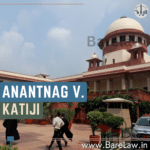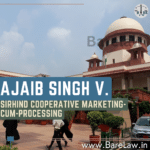
Table of Contents
Doctrine of Lis Pendens in Indian Property Law: Analyzing G.T Girish v. Y. Subba Raju | BareLaw
The Supreme Court’s decision in G.T Girish v. Y.Subba Raju (AIR 2022 SC 61), gives a critical analysis and explanation of the doctrine of lis pendens as provided in Section 52 of the Transfer of Property Act, 1882. This is an important case for understanding how unresolved litigation affects property dealing in India.
Background and Parties Involved The case started with the Bangalore Development Authority (BDA) allotting a plot to the first defendant, who later made a lease-cum-sale agreement with the BDA. Consequently, the appellant and the first defendant entered into an agreement of sale and purchase of site which led to many legal complications that finally culminated in a suit for specific performance.
Legal Dispute and High Court’s Ruling Thus, subsequent transactions relating to the property were carried out after the death of the first respondent. The High Court held that the transfer on behalf of second respondent was illegal and not affected by lis pendins doctrine.
Supreme Court’s Judgment On other hand, Supreme Court disagreed with High Court in as much as it observed that neither notice received by transferee nor bona fides of his act are material for section 52 purposes. It is not void but voidable but subject to outcome or result on pending case, it made clear therefore court emphasized this doctrine should not be mistaken with good faith or bona fide concepts.
Doctrine of Lis Pendens Known as “pendente lite nihil innovetur” meaning nothing new should be introduced during litigation; hence, this principle forms basis for doctrine of lis pendens thereby establishing its relevance in maintaining effectiveness within judicial process. Accordingly, Supreme Court found that notice and constructive notice had no place at all when lis pendens cases are concerned thereby reversing High Court decision.
Girish v. Y.Subba Raju: A Landmark Case Elucidating Doctrine Of Lis Pendens In Indian Property Law And Its Relevance To Property Transactions Pending Litigation Subject To Final Decision Of The Court This is a very important case in Indian property law and clarifies the applicability of Section 52 of the Transfer of Property Act.
Summary:
The article discusses G.T Girish v. Y.Subba Raju, an important Supreme Court case that explains the doctrine of lis pendens under Indian property laws. It looks at the background, legal dispute and judgment by Supreme Court highlighting how this doctrine helps in maintaining effectiveness of proceedings in relation to properties during judicial hearings.





